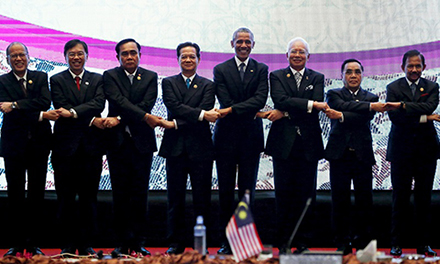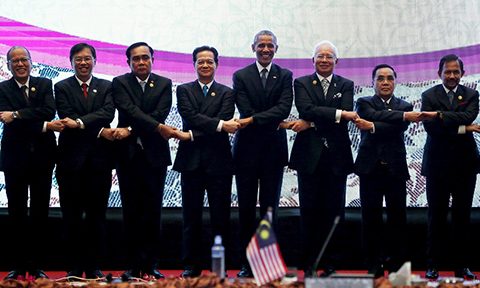
Human rights and democracy weren’t given a helping hand as ASEAN leaders met with US President Barack Obama on 15-16 February.
US-ASEAN summit shows that a new Cold War mindset is descending on Asia.
During the Cold War the US and its Western allies proved more than willing to put their commitments to human rights and democracy on hold in the name of self-interest and anti-communism.
In Latin America, Africa, the Middle East and Asia, wherever there was superpower competition, there was the trumping of democracy by ‘the national interest’, a slippery term that usually just meant not losing to the presumed machinations of Moscow.
The Sunnylands Special Leaders’ Summit, held February 15-16 between ASEAN member states and the US, shows that China is viewed in much the same way as was the Soviet Union, and that the response from Washington is also going to be similar.
The Joint Statement released by the heads of state/government may not mention China, but it is all about Beijing.
Articles 7 and 8 refer to the UN Convention of the Law of the Sea, and particularly call out the right of freedom of navigation, overflight and unimpeded maritime commerce. All of these have been, at least to those attending the Summit, been jeopardised by Beijing’s increasingly hawkish claims in the South China Sea, most recently installing surface to air missiles on reclaimed islands – presumably to make navigation and overflight considerably less ‘free’.
Elsewhere the document talks of ‘ASEAN Centrality’ in the evolving regional architecture of the Asia-Pacific – all very neutral until we consider that China has its own dreams of ‘centrality’ in Asian institutions, be that through the Asian Infrastructure Investment Bank that the US has not only avoided joining but is reported to have pressured its allies to decline membership, something that has been remarkably unsuccessful.
Beyond those references the remainder of the statement repeats traditional ASEAN mantras – strengthening commitments to economic development, enhancing collaboration, promoting sustainable growth. All laudable goals and all crucial if ASEAN is to play a role, as Washington no doubt hopes, as a growing counter-weight to China in the region, even if that role remains implicit.
The document also includes the words ‘human rights’. Article 4 talks of the need to ‘strengthen democracy, enhancing good governance and adherence to the rule of law, protecting human rights and fundamental freedoms’.
This is not enough, however, to meet the pressing need to promote these values in at least some of ASEAN’s members let alone the demands of some that human rights ‘top the agenda’. The partial but impressive democratic transition of Myanmar since 2010 has been paralleled by a decline in democracy in Thailand, and ongoing struggles in many other ASEAN states, perhaps most notably Cambodia, Laos and Vietnam.
The joint statement goes no further, in fact falls far short, of ASEAN’s own internal commitments to rights and democracy in the 2007 ASEAN Charter or the 2012 ASEAN Human Rights Declaration, both of which are weak documents widely violated by the very states that created them.
Compare America’s willingness in 2016 to put a narrow reading of its geostrategic interest over its values to the situation in the immediate post Cold War world. Then, in the early 1990s, it was the universal validity of democracy that strongly influenced US foreign policy in Southeast Asia.
With China’s growth only just starting to register, the US was a vocal critic of the so-called ‘Asian Values’ argument that saw many leaders in Southeast Asia claim that civil and political rights had to be truncated in the name of strong states and economic development. Today Cambodia’s Hun Sen, widely decried for his human rights abuses over a 30-year period in power, is posing for photographs with the US President.
Values are often the first thing to be squeezed out of the equation when geopolitical necessity is thought to be pressing. That the US-ASEAN Summit has unfolded the way it has suggests that Washington is now well aware of the immediacy and significance of China – no longer its rise but the consequences of it having risen. The Summit has served both to reinforce ASEAN as a diplomatic resource to marshal against Beijing where possible and to show that the US is more willing to talk ASEAN’s language than push its own beliefs in human rights and democracy.
This is unsurprising but regrettable, and perhaps even short-sighted. Unsurprising because that is what powers do when challenges, history gives us numerous examples. Regrettable because the US retains significant influence in the region to push a more ambitious agenda.
But it is the short-sightedness of it that worries me most. If the US and China are really moving towards a more openly aggressive relationship, then what sort of allies does Washington want to have on its side? The Europeans are a whole hemisphere away, internally divided with their own squabbles. We in Australia can offer little in terms of direct ability to face down Beijing. It is to the countries of the Asian rim – Japan and South Korea, with Taiwan lurking in the background – but also ASEAN and its members that US attention and expectation will ultimately have to rest upon.
An ASEAN disunited in its respect for the values the US seeks to promote is an ASEAN susceptible to division, an ASEAN capable of only the weakest of commitments, an ASEAN whose activities, diplomacy and support cannot be relied upon.
The long-term interests of the US are not met by relying too heavily on an ASEAN that does not share its vision of order and justice.
Whilst it was all smiles in Sunnylands, there remain many causes to frown.
Dr Mathew Davies is head of the Department of International Relations at the Australian National University’s Coral Bell School of Asia Pacific Affairs.
 Facebook
Facebook  Twitter
Twitter  Soundcloud
Soundcloud  Youtube
Youtube  Rss
Rss 